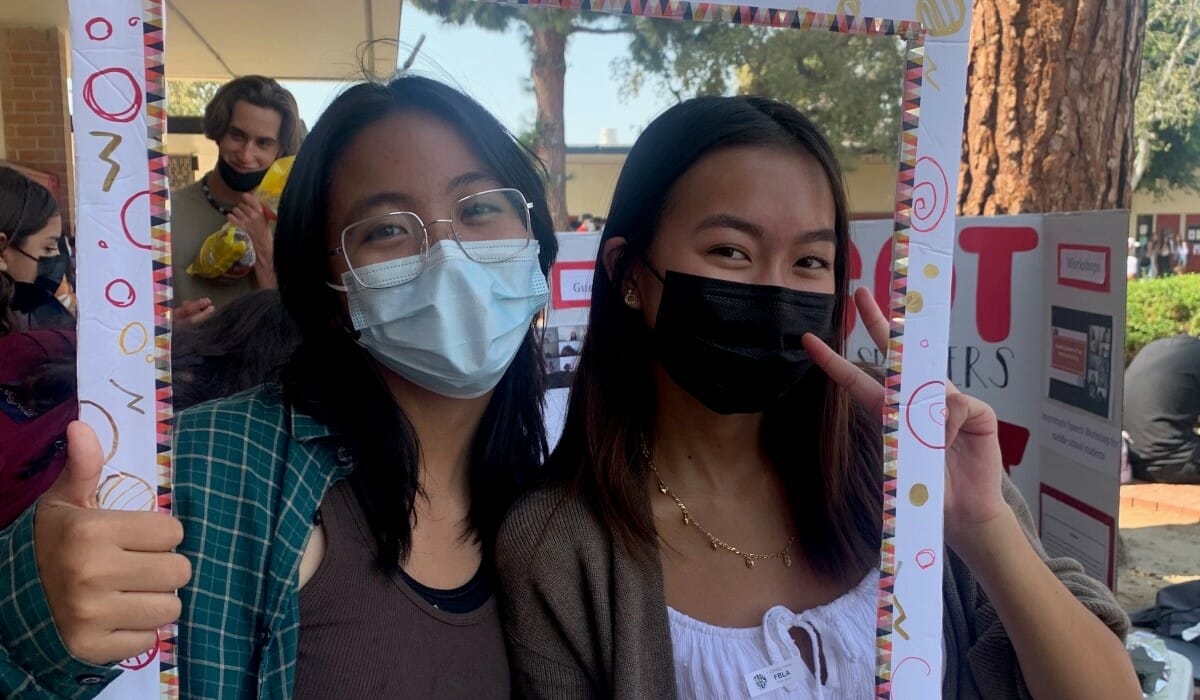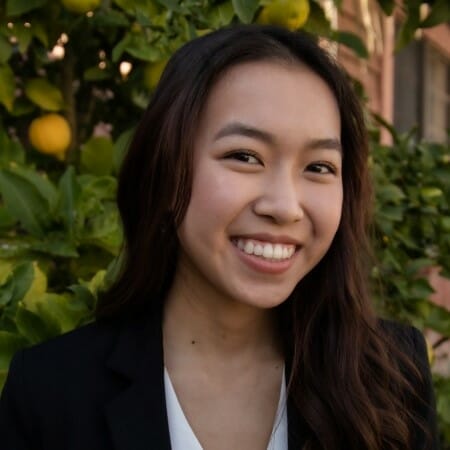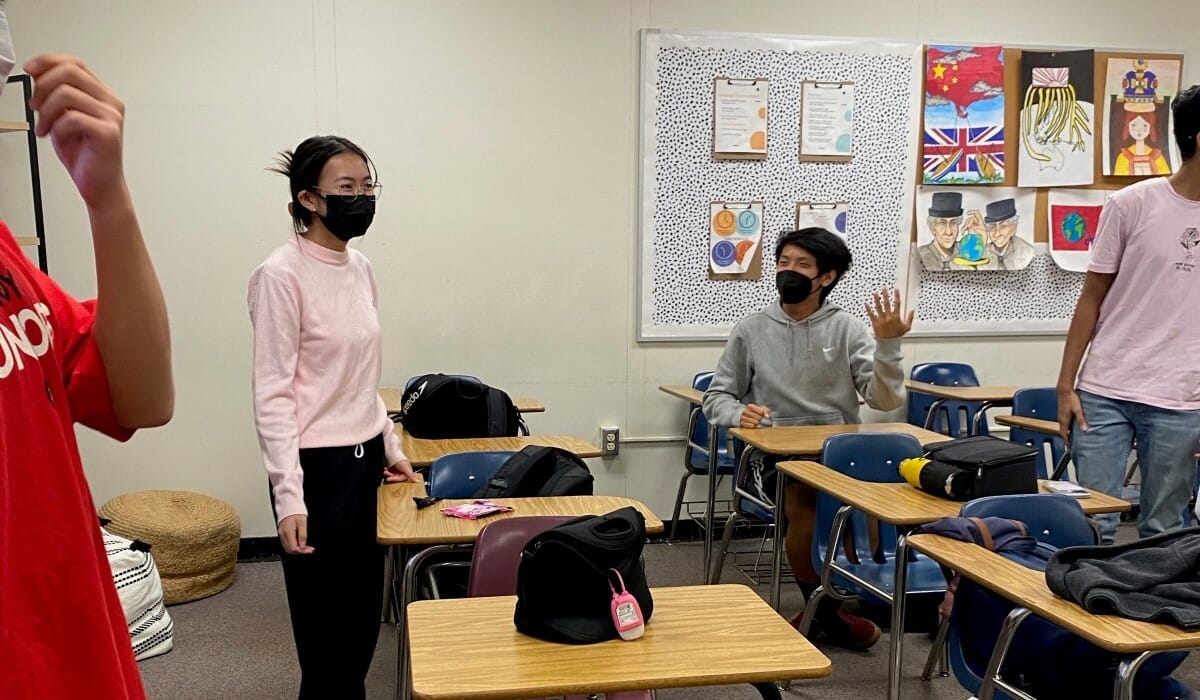Southern California High Schooler Champions Humanities Education in a STEM-Focused Community

Meet Daily Point of Light Award honoree Kayla Nguyen. Read her story and nominate an outstanding volunteer or family as a Daily Point of Light.
Kayla Nguyen, a senior in high school, is a self-described foodie who loves living in Orange County, an area where many different cultures collide. One side effect of going to a magnet school in the area, however, is a strong proclivity for students chasing STEM-related goals. And as a result, she found herself missing the mock trial program she loved as a younger child.
When the world was in lockdown in June 2020, Kayla decided to change that. She founded Student Speakers of America, a group that provides humanities-based extracurriculars, resources, and speech education on everything from presentations to debate. Today, in the midst of applying for colleges, she offers classes to students everywhere as Zoom has—as in most of our lives—found a permanent place in her programs. With two local chapters and volunteers from more than seven California cities, they’re just getting started.
What inspires you to volunteer?
It’s the personal experiences that I’ve had and also the people around me. Student Speakers of America (SSOA) is an organization I founded with my friend promoting humanities extracurriculars to kids ages 8-14. In my community, there is a lack of access to them. There’s a lot of focus on STEM-based extracurriculars, like biology or cyber. While that’s great, especially for women who haven’t had previous access to that, there is a lack of focus on public speaking and understanding the stories of others. I participated in mock trial in middle school, so I really wanted to do something where middle schoolers and other young students could get involved before they were older.
Describe your volunteer role with Student Speakers of America.
I’m the co-founder. I help run our volunteer chapters and some extra activities that we do. My co-founder and I really want to make everything accessible, so we are always brainstorming new ideas for things to add to our website.
I try to make my own volunteer opportunities for things I’m passionate about. One way I volunteer is through film. I go out and highlight stories and experiences in my community. I’m currently working on a project with a friend highlighting local small business founders and have a series about the Asian experience, especially with COVID-19. I’ve also done student documentaries about mental health and experiences at my school. I publish them on Instagram or YouTube and have submitted them to multiple competitions.

You started this when the world was in lockdown. Did that present any specific challenges?
I originally wanted it to be strictly in-person – activities in the library and promoting things through flyers. But we ended up going online to try to make everything accessible. It actually expanded our reach and made us realize that we could reach people in different states and around the world. It really gave us more freedom to talk to more people.
If you could give one or two tips to people who struggle with public speaking, what would you tell them?
First, don’t be afraid to try. I know that’s cliché, but I think telling your story or someone else’s is a role everyone needs to take at some point in their lives. You need to be a voice for others and a voice for yourself. Why let someone advocate for you when you could be advocating for yourself?
Second, keep the audience you’re speaking to in mind. You have to adjust accordingly with language and body language.
What’s been the most rewarding part of your work?
I really appreciate hearing kids say they want to pursue this activity in the future. When I think about SSOA’s impact, I think about students coming up after workshops and saying, “When are you having another workshop? I love talking about this topic. And I want to do it again next month.” Small moments like that mean a lot to me. One student who really likes debate came to three consecutive workshops!
What have you learned through your experiences as a volunteer?
I learned how to adjust the goals that I set in the beginning. What SSOA has become is completely different from what I thought it would be when I first started it, and I don’t think that’s necessarily a bad thing. I think it was an interesting process to adjust and to start new things based on what was well-received and what people seemed to want.

Are there any future partnerships, programs, or events that you are excited about?
We’re currently working with another nonprofit based in Irvine to do some online events together. We’re still working the logistics out, but we’re hoping to expand both of our reaches.
We also recently received the Taco Bell Foundation’s Ambition Accelerator grant, with is $500 that we’re planning on using to fix our website and to increase our investment in our activities. We really want to expand our reach across the United States. SSOA is open to everyone. That’s what we want to emphasize.
Why do you think it’s important for others to be involved with their community?
It’s important to help give other people opportunities that you didn’t have growing up. Plus, it makes you appreciate your community even more as it helps you stay grounded. Knowing where you came from is what makes you who you are.
What do you want people to learn from your story?
If you’re thinking about volunteering or creating your own volunteer organization, really examine people around you and see what your community needs. Don’t just do it because you have an idea in your head. You need to look for things that other people need and really focus your attention on others.
Do you want to make a difference in your community like Kayla? Find local volunteer opportunities.
